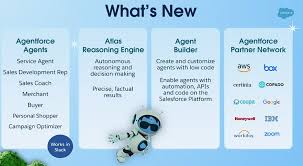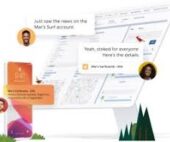Agentforce was the highlight of the week in San Francisco during Salesforce’s annual Dreamforce conference—and for good reason! Agentforce Advances Copilot and Prompt Builder and that is truly exciting. Agentforce represents a groundbreaking solution that promises to transform how individuals and organizations interact with their CRM.
However, as with any major product announcement, it raises many questions. This was evident during Dreamforce, where admins and developers, eager to dive into Agentforce, had numerous queries.
Here’s an in-depth look at what Agentforce is, how it operates, and how organizations can leverage it to automate processes and drive value today.
Agentforce Advances Copilot and Prompt Builder
Many Dreamforce attendees who anticipated hearing more about Einstein Copilot were surprised by the introduction of Agents just before the event. However, understanding the distinctions between the legacy Einstein Copilot and the new Agentforce is crucial. Agentforce Advances Copilot and Prompt Builder.
Agentforce Agents are essentially a rebranding of Copilot Agents but with an essential enhancement: they expand the functionality of Copilot to create autonomous agents capable of tasks such as summarizing or generating content and taking specific actions.
Here are some key changes in terminology:
- Agentforce: The umbrella term for generative AI-based agents within Salesforce.
- Agent Actions/Agent Studio: Previously referred to as Copilot Actions/Copilot Studio, these are the specific tasks an agent can perform, such as identifying a record, summarizing a record, or composing a sales email.
- Prompt Builder: This remains the same, used to create generative AI prompts for various LLMs (or an LLM of choice).
Just like Einstein Copilot, Agents use user input—an “utterance”—entered into the Agentforce chat interface. The agent translates this utterance into a series of actions based on configurable instructions, and then executes the plan, providing a response.
Understanding Agents: Topics
A key difference between Einstein Copilot and Agentforce is the addition of “Topics.” Topics allow for greater flexibility and support a broader range of actions. They organize tasks by business function, helping Agents first determine the appropriate topic and then identify the necessary actions.
This topic layer reduces confusion and ensures the correct action is taken. With this structure, Agentforce can support many more custom actions compared to Copilot’s 15-20, significantly expanding capabilities.
Understanding Agents: Actions
Actions in Agentforce function similarly to those in Einstein Copilot. These are the tasks an agent executes once it has identified the right plan. Out-of-the-box actions are available right away, providing a quick win for organizations looking to implement standard actions like opportunity summarization or sales emails.
For more customized use cases, organizations can create bespoke actions using Apex, Flows, Prompts, or Service Catalog items (currently in beta).
Understanding Agents: Prompts
Whenever an LLM is used, prompts are necessary to provide the right input. Thoughtfully engineered prompts are essential for getting accurate, useful responses from LLMs. This is a key part of leveraging Agent Actions effectively, ensuring better results, reducing errors, and driving productive agent behavior.
Prompt Builder plays a crucial role, allowing users to build, test, and refine prompts for Agent Actions, creating a seamless experience between generative AI and Salesforce workflows.
How Generative AI and Agentforce Enhance CRM
GenAI tools like Agentforce offer exciting enhancements to Salesforce organizations in several ways:
- Productivity: Agents can automate tasks like summarizing customer interactions, significantly reducing prep time for client-facing teams.
- Personalization: Automatically generated, context-rich emails enable better customer service and proactive issue management.
- Standardization: Using templates for prompts or actions ensures consistency, whether summarizing account information or managing workflows.
- Efficiency: By automating routine workflows, such as handling service cases, Agentforce frees up team members to focus on higher-value tasks.
However, these benefits are realized only when CRM users adopt and adapt to AI-assisted workflows. Organizations must prioritize change management and training, as most users will need to adjust to this new AI-powered way of working.
If your company has already embraced AI, then you are halfway there. If AI hasn’t been introduced to the workforce you need to get started yesterday.
Getting Started with Agentforce
With all the buzz around Dreamforce, it’s no surprise that many organizations are eager to start using Agentforce. Fortunately, there are immediate opportunities to leverage these tools.
The recommended approach is to begin with standard Agent actions, testing out-of-the-box features like opportunity summarization or creating close plans. From there, organizations can make incremental tweaks to customize actions for their specific needs.
We have all come to expect that just as quickly as we include agentic ai into our processes and flows, Salesforce will add additional features and capabilities.
As teams become more familiar with developing and deploying Agent actions, more complex use cases will become manageable, transforming the traditional point-and-click Salesforce experience into a more intelligent, agent-driven platform.
Already I find myself asking, “is this an agent person or an ai-agent”? The day is coming, no doubt, when the question will be reversed.
Tectonic’s AI Experts Can Help
Interested in learning more about Agentforce or need guidance on getting started? Tectonic specializes in AI and analytics solutions within CRM, helping organizations unlock significant productivity gains through AI-based tools that optimize business processes. We are excited to enable you to enable Agentforce to Advance Copilot and Prompt Builder
By Tectonic’s Solutions Architect, Shannan Hearne













